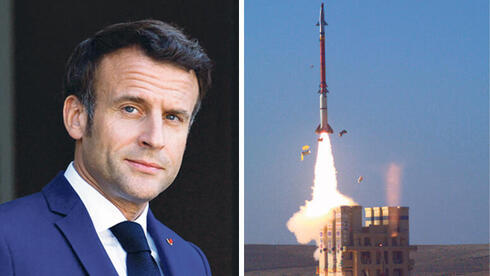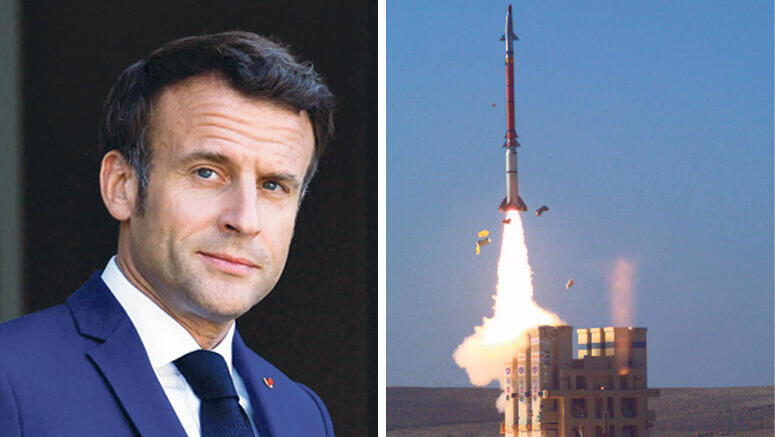
France clamps down on Israeli arms showcase amid Gaza warfare
Israeli defense companies face bureaucratic hurdles ahead of Paris Eurosatory exhibition
In the shadow of the ongoing war in Gaza, France is taking an unusual step to toughen conditions for the participation of defense companies from Israel in the Eurosatory arms exhibition scheduled for Paris in June, Calcalist has learned.
Companies intending to participate in the exhibition, showcasing new developments and central weapon systems, have been informed in recent days that the equipment they wish to reveal must obtain an import license granted in advance by the French Ministry of Defense. Without this license, they will not be able to present their products on French soil. According to a source in one of the companies, the French Ministry of Defense will have the authority to prohibit the presentation of Israeli weapons at its discretion.
1 View gallery


French President Emmanuel Macron; Right: David's slingshot system.
(Photos: Reuters, Ministry of Defense)
Several dozen Israeli defense companies are scheduled to participate in the exhibition, either through independent booths or as part of a booth of SIBAT, the International Defense Cooperation directorate at Israel's Ministry of Defense (IMOD), which is supposed to be set up in the exhibition complex.
Senior officials in the defense industries, in conversations with Calcalist, have expressed resentment towards the new French demand, calling for an in-depth investigation at the political level. Many of them have extensive experience participating in security exhibitions worldwide. France hosts two of the most prestigious and respected arms exhibitions globally, the Paris Air Show at Paris–Le Bourget Airport and the Eurosatory military exhibition, held in rotation once every two years.
"I have participated in many exhibitions like this, and there has never been such a demand, which simply diminishes Israel's status," an executive at one of the companies told Calcalist. "Requiring prior approval from authorities to bring exhibits to the exhibition is humiliating and cannot stand."
The defense establishment views the unusual demand as an attempt to pressure Israel amidst the ongoing war in Gaza, which faces increasing criticism from the international community. This criticism stems from the high civilian casualty count and limited humanitarian aid entering Gaza. Criticism of Israel's actions has increased, with comments from US President Joe Biden and warnings from American officials about potentially limiting Israel's use of American weapons.
In recent weeks, Britain has also discussed processes to restrict arms exports to Israel, as have senior officials in other European countries. A few weeks ago, a court in the Netherlands granted a demand from human rights organizations to ban the export of spare parts for F35 aircraft used by the Israeli Air Force. Although Israel can receive spare parts directly from the USA, some raw materials used by its weapons industry are imported from European countries.
Next month, the air defense exhibition FIDAE 2024, focusing on Latin America, is scheduled to be held in Chile. The Chilean government decided to forbid Israeli companies from participating, despite intentions from companies like IAI, Rafael, and Elbit Systems to present their products there.
"The market in Latin America is small and not critical for us, so Chile's decision is not terrible," said an executive from one of the companies. "However, Eurosatory is a completely different, fundamental, and serious event. It appears that the French do not want to see an Israeli presence at the exhibition at this time. Every year, these exhibitions become focal points for demonstrations by pro-Palestinian elements, and this year, following the war in Gaza, they may be much larger and more disruptive."
For the most part, Israeli companies participating in defense exhibitions worldwide are highly attractive due to the advanced weapon systems they present, generating significant interest among representatives of armies and defense bodies. "Such a drastic change in the demands of Israeli companies is an expression of a clear position against Israel, much more than a subtle hint," an executive at one of the companies told Calcalist.
The exhibition in June is expected to attract global attention amidst ongoing conflicts, including the war in the Middle East. Similar to other exhibitions of this magnitude, Eurosatory is anticipated to be attended by heads of state, army commanders, and procurement officials seeking exposure to combat systems and modern military technologies. For Israeli industries, this event is crucial for marketing and initiating future arms deals.
With the beginning of the war in Ukraine, Israeli industries have become a focus for many armies seeking to renew their arsenal of weapons, particularly advanced air defense systems developed against the backdrop of rocket and missile threats on the Israeli home front. Finland purchased the David’s Sling defense system from Rafael last year for NIS 1.3 billion, while Germany made a huge deal worth about NIS 14 billion ($3.8B) for the Arrow 3 defense system from IAI.
In the middle of last year, as the Bundestag approved the Arrow missile deal, France objected to Germany's move, arguing that NATO countries should develop their own defense systems instead of purchasing missiles from Israel. Despite France's displeasure, the German Ministry of Defense proceeded with the deal.
In response to France's tougher conditions for Israeli exhibitors at Eurosatory, several defense industries have appealed to Israel's Ministry of Defense to intervene. Calcalist has learned that the issue was examined by the office's director-general, Major General (res.) Eyal Zamir, and the head of the defense export division, Brigadier General (res.) Yair Koles. As of now, there has been no response from the Ministry of Defense, and the French consulate in Israel has not provided comment.













